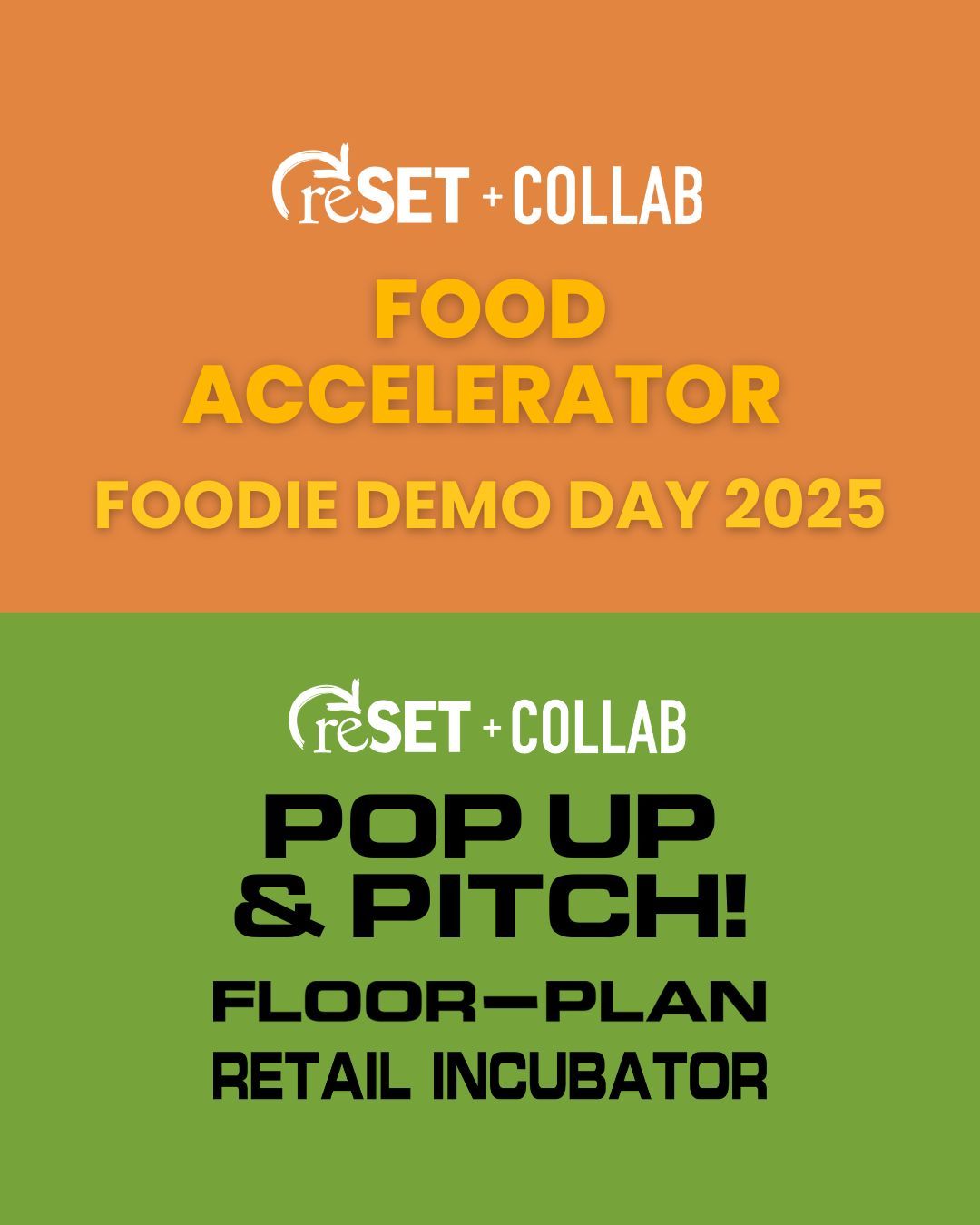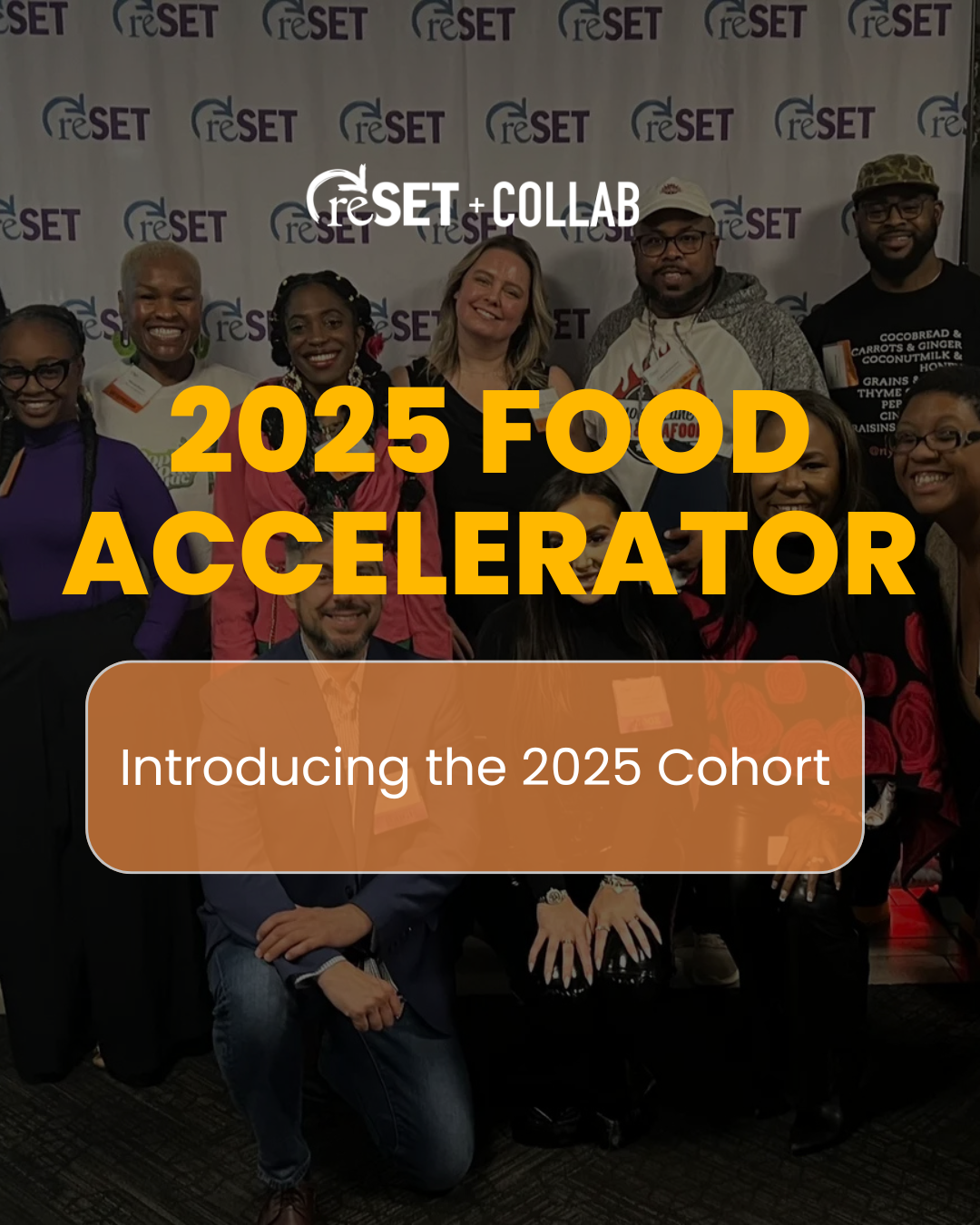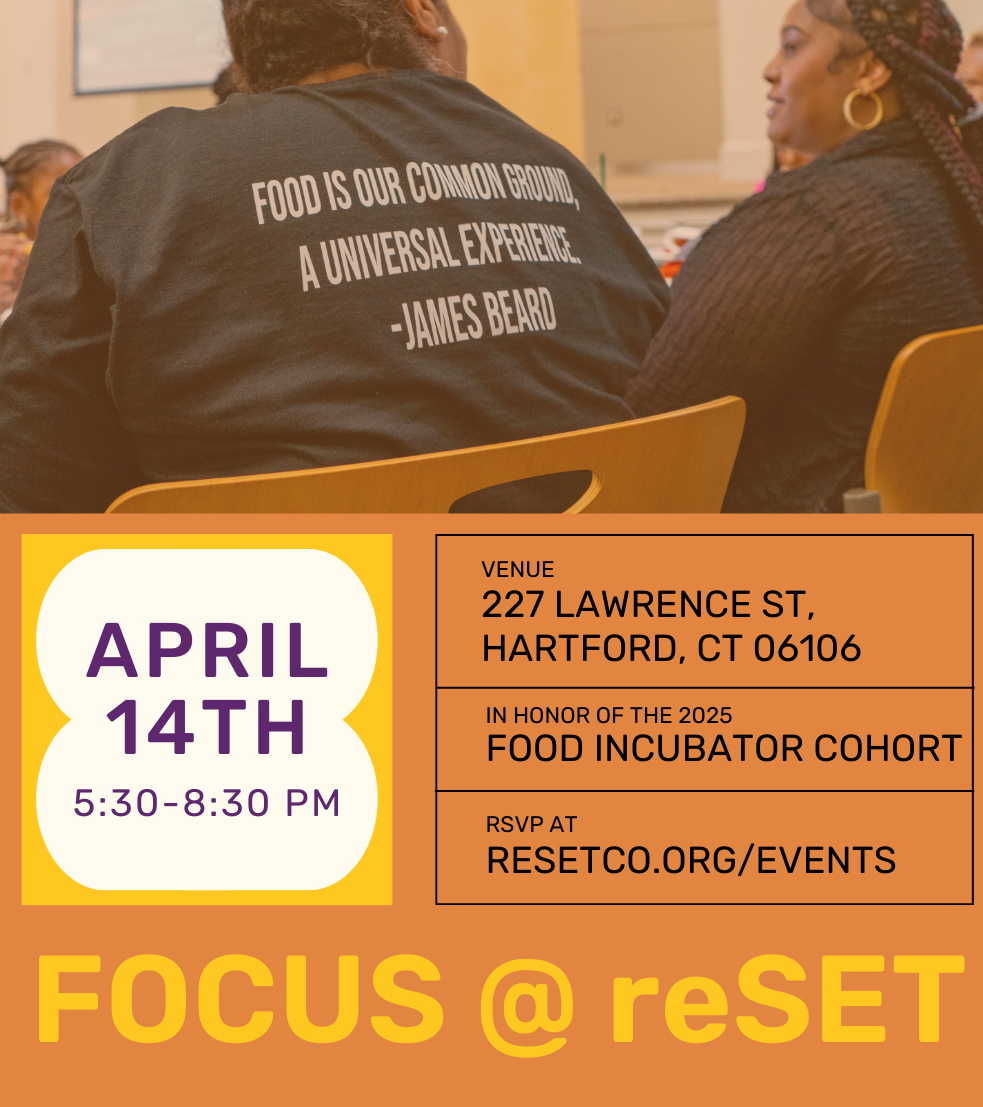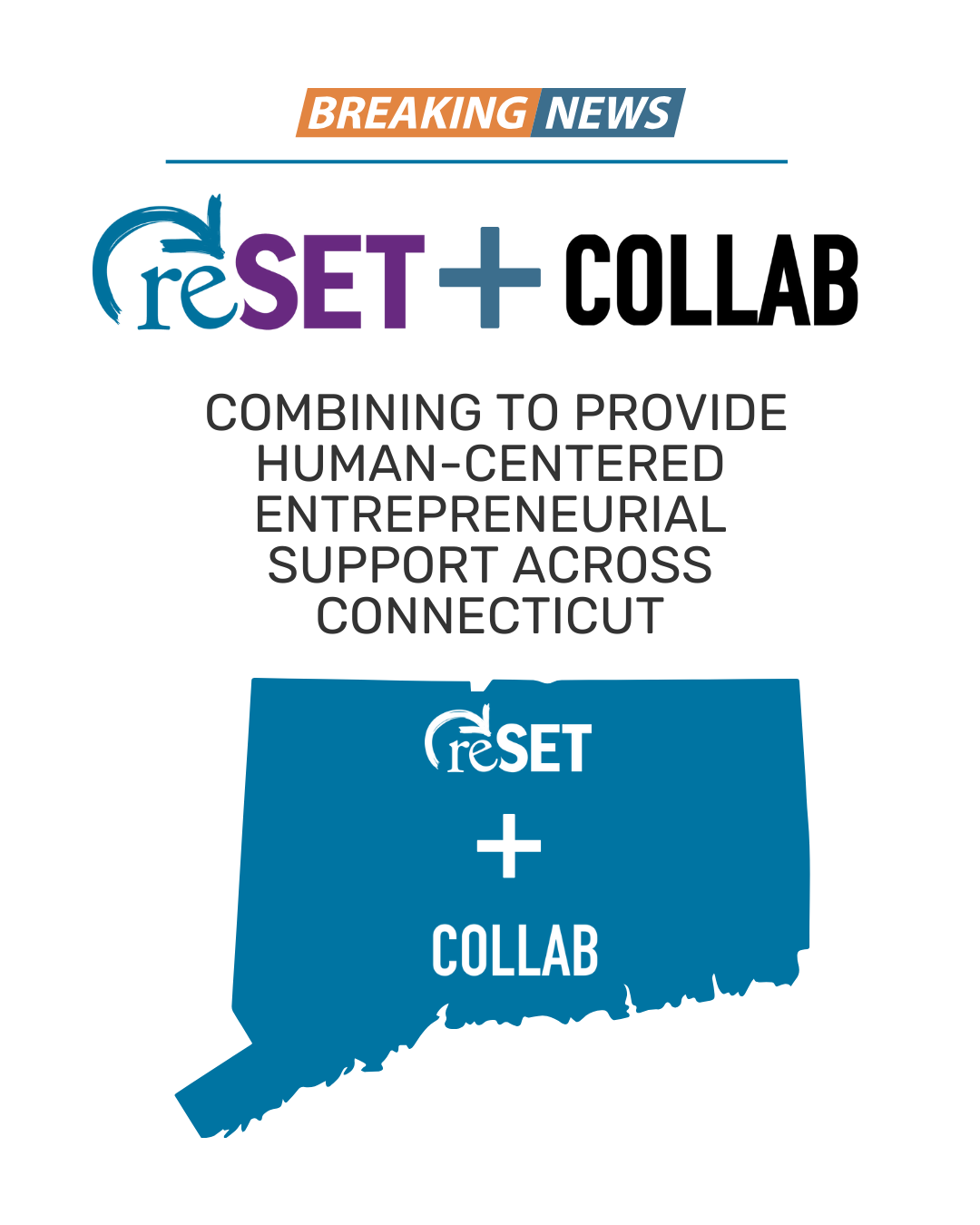On Tuesday, 40 entrepreneurs and community stakeholders gathered at reSET’s latest Healthy Communities Design Lab event: Food for Thought. A panel of representatives from Wholesome Wave, Billings Forge Community Works, who hosted the event, and Hartford Food Systems discussed the challenges and barriers to access, distribution, and awareness of healthy food in Connecticut. The heart of the discussion, however, focused on how CT entrepreneurs can roll up their sleeves and start building businesses to strengthen our local food systems.
Each speaker helped dispel some of the false assumptions about eating habits and our food supply, including,
- It is primarily low income citizens who need to be educated on healthy eating;
- there are no new, young farmers building businesses in Connecticut,
- investment isn’t being made in local food enterprises; and
- sustainable community food distribution is not scale-able.
All three panelists, each of whom are leading change efforts within our local food economy, challenged these assumptions, and described how they distort the understanding that entrepreneurs have about opportunity within the sector. And, most importantly, each made the business case for increasing the quality and access to nutritious food systems across our state.
Martha Page, Executive Director of Hartford Food Systems, advised, “if you want to look at the economic opportunity for food entrepreneurs to build sustainable, profitable businesses, well, there’s a huge opportunity, right now.” Julia Pon, Innovations Lab Manager at Wholesome Wave, and Amara Watkin-Anson, Urban Agriculture Coordinator at Billings Forge, agreed.
So what’s the first step?
Everyone on the panel recommended that entrepreneurs first need to understand the challenges of our current food system. The panel moderator, Jean Stetz-Puchalski of Individual Differences at Work, posed the question, “how long has it taken for CT food organizations to see a positive change within CT food systems?” Page responded that progress is happening more slowly than she would like. Her organization, Hartford Food Systems, has been operating in CT for nearly 36 years, and is responsible for one of the first farmer’s markets in Hartford. She added, “Either we’re really bad at our work or the food system problems we face are really entrenched.” Here are a few of the issues that were mentioned specifically and that pertain directly to CT:
- 37% of our 3-5 year olds are obese;
- There are numerous “food deserts” in our State where residents lack easy access to a grocery store or public transportation. This creates a cycle of unhealthy habits like purchasing high calorie, low nutrient food at gas stations;
- Less than 5% of consumption in CT comes from local sources, which makes our state 95% dependent on outside food sources;
- A few large institutions serve food to a very large population, rather than multiple smaller farms serving the population. This makes CT’s food supply vulnerable;
- Both our food production and food distribution industries operate in silos, without much coordination; and
- If planes stopped flying overhead to bring us our grain, fruits, and vegetables, it would take New England, CT included, at least 50 years to get to just 70% of self-sustainable food production.
Right now, our food system is unsustainable, and far from resilient.
However, with each of these challenges comes opportunity. When our panelists were asked how some of these problems can be addressed, their faces lit up with possibility. Of course, no one has the definitive solution to the issues at hand, but in response, Julia Pon of Wholesome Wave cited other examples of organizations from across the country who are creating change at a community level, and leveraging that progress to scale their models, influence public policy, and incentivize investment in better food systems. She described how Wholesome Wave’s Fruit and Vegetable Prescription Program fosters innovative partnerships between healthcare providers and farmers markets. The program measures the impacts of increased consumption of fresh fruits and veggies in under-served populations, and more specifically, develops new partnerships with health providers like Blue Shield Insurance. Since the beginning of the program, Wholesome Wave has been tracking the impact of how better food conversations between health providers and patients can lead to better health. Their metrics to date show:
- 90% of participants in the program were told about the importance of healthy foods by their health providers;
- 55% increased their fruit and vegetable production as a result; and
- 37.8% of child participants decreased BMI (body mass index) over the period of the program.
In a nation where 135 billion dollars is allocated annually to an almost entirely preventable disease such as diabetes, efforts like these to improve eating habits nationwide could have a substantial impact on health and healthcare spending. With business models that blend profit and purpose, food based social enterprises, entrepreneurs can help create a more secure, resilient, and sustainable food system. These outcomes would lead to better health for all our citizens.
Entrepreneurial Opportunities in Food Distribution:
One big opportunity, brought up by all three panelists, was the feasibility of Food Hubs in New England, and especially CT. Food Hubs are a new kind of business model that act as the central point between local and regional suppliers (growers) and distribution streams for their goods. These single facilities manage the aggregation, storage, processing, distribution, and marketing of regionally produced goods. Food Hubs could give CT and regional farmers the opportunity to strengthen their wholesale, retail, and institutional demand. CT is prime location for this new kind of model because of it’s proximity to markets in Providence, Hartford, New Haven, Boston, Worcester, and New York which could mean a lot more distribution channels for CT grown goods.
So, why hasn’t this happened already? Entrepreneurs interested in pursuing the opportunity are needed. As Julia Pon of Wholesome Wave notes, “there is investment, there are resources, and there is a big-time readiness., but there needs to be more food entrepreneurs at the table.”
In addition, entrepreneurs have the opportunity to build businesses that:
- educate about where food comes from;
- manufacture and develop CT grown goods; and
- build sustainable food business models like CSA’s (community supported agriculture).
To make the case that now is the time for food entrepreneurs in CT, Martha Page shared the fact that CT is one of the only states that has experienced a rise in new farms over the past two years. With this increase in farming, comes the growing interest in and availability of resources, investment, and viability for food focused entrepreneurial ventures. To support a new cohort of CT food entrepreneurs, Wholesome Wave mentioned that they are looking to invest in sustainable food businesses, and have even created a “toolkit” for investors. These tools help investors and food entrepreneurs to speak the same language. Check out their Innovations Lab Program here.
Aside from conversation about business, both speakers and the audience shared a very important dialogue about the changes occuring in the way we think about, interact with, and value food. Aside from our rise of farmers, there is a noticeable shift in consumer demand toward local goods. Here in CT, we can be proud to host what was recently considered the nation’s best farmer’s market, The Coventry Farmer’s Market. Any given Sunday, May through October, you can visit this farmer’s market and see hundreds of locals buying local goods. According to FarmAid, a powerful network for the farmed food movement, the amount of farmer’s markets has increased 250% in the last 15 years.
We have also seen the rise in farm to table restaurants, community farm dinners, a desire to get healthy food in our schools, and a genuine voice for the support of organic food, sustainable agriculture, and goods made closer to home. Most importantly, new programs are engaging youth in healthy eating. Amara Watkin-Anson of Billings Forge offered the panel discussion an inspiring insight in to the significance of teaching youth, on a neighborhood level, about where their food comes from and how to value fruits and vegetables.
Among these attributes, Tuesday’s panel discussion brought to light some fundamental thoughts from the community of people most experienced with and passionate about CT’s food system;
- The time has come to think less about food security and more about food sovereignty;
- Everyone needs to know where their food comes from, not just under-served communities;
- Healthy food is not just for the wealthy;
- Health professionals stated that we need to engage more primary care doctors in talking to patients about healthy food; and
- People need to understand that either we find a way for everyone to pay for healthy food now by making it more accessible, or we pay for it later in our current cycle of exorbitant health costs.
Everyone agreed that this is a big conversation. However, it’s also important to talk about the many opportunities to directly improve the health of our communities, our state, and all our citizens. We need to change the way we think about food, and we need to support the emergence of new and innovative businesses that improve the resilience and sustainability of our food system.
We hope that this recap of our Food for Thought conversation inspires you. To take action, please consider shopping local, getting to know the farmer’s in your town, finding your local farmer’s market, and supporting a local food entrepreneur. We also invite you to continue to build new meaningful, connection with community innovators, and to join the conversation in our online community forum.








